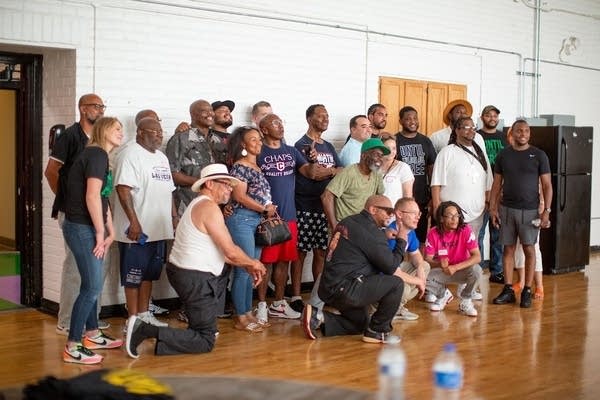You asked: Can people convicted of a felony vote in Minnesota?

Go Deeper.
Create an account or log in to save stories.
Like this?
Thanks for liking this story! We have added it to a list of your favorite stories.
An MPR News reader messaged us on Instagram to ask if people who have been convicted of a felony or incarcerated can vote in Minnesota. We asked the experts.
Can people currently in prison vote in Minnesota?
No. The Office of the Minnesota Secretary of State reports that you are able to vote after all parts of your sentencing is complete. Therefore, a person must be out of prison and be done with probation, parole or any form of supervised release to be able to vote.
A report from The Sentencing Project in 2021 said about 65,000 Minnesotans are unable to vote due to state law regarding their criminal record.
At Mitchell Hamline School of Law, Brad Colbert is director of legal assistance to Minnesota prisoners, which provides legal help in many different forms to those affected by the justice system in Minnesota.
Turn Up Your Support
MPR News helps you turn down the noise and build shared understanding. Turn up your support for this public resource and keep trusted journalism accessible to all.
“Right now, Minnesota has this thing called the restoration of your civil rights, and if your civil rights is restored then you can vote again,” Colbert said.
For many, the battle of restoration of their civil rights can be a long one. There are a lot of situations in which someone has completed their prison sentence but is still “on papers,” which refers to being on probation, parole and any form of supervised release.
Colbert said he disapproves of Minnesota’s approach because he knows that some people can be “on papers” for decades, leaving them unable to know if and when they will be able to exercise their voting right again.
How does Minnesota law on this compare to other states?
Minnesota is in the middle: There are some states that have the same laws for felons and then there are states with more lenient laws and some with stricter laws.
According to National Conference of State Legislatures data from 2021, Maine and Vermont are the only two states where the right to voting is never lost, even during incarceration, as well as Washington, D.C.
There are 21 states where felons receive automatic restoration once they are out of prison, 16 states including Minnesota where they must complete their sentence and be “off papers,” and 11 states where voting rights are lost indefinitely for some crimes or require a governor's pardon.
David McKinney is the lead attorney for the ACLU of Minnesota, which works to protect Minnesotans’ civil rights.
“Once you have a record, it is hard to overcome barriers. Voting should be a way to connect them with elected officials who fight for things that matter to them, so it is important that some laws change so they can vote,” McKinney said.
Who is most impacted by these laws and policies?
Recent data from The Sentencing Project shows that African Americans are the most disenfranchised. Their voices are less likely to be heard through voting on Election Day due to a criminal record.
“One in 19 African Americans of voting age is disenfranchised, a rate 3.5 times that of non-African Americans. Among the adult African American population, 5.3 percent is disenfranchised compared to 1.5 percent of the adult non-African American population,” The Sentencing Project reported in October.
The project noted that more than 500,000 Latinx Americans are also disenfranchised.
Kahlee Griffey is the co-founder of Until We Are All Free, a Minnesota nonprofit that helps provide resources to those disenfranchised by incarceration.
“America's issue of mass incarceration is an issue of race — it was a specific plot to incarcerate a large number of people of color because those are the people's votes they do not want,” Griffey said. Experts say African Americans are five times more likely to be incarcerated than white Americans.

The laws prohibiting people with criminal records from voting can possibly keep them silent their entire lives. Griffey said this can be unfair because those people still pay taxes and still live in the community, but ultimately they have no voice in what affects them.
“The system locks up people of color, more Black people in particular. So where we are is we are disenfranchising people of color, and that has been true and it is based on the idea of this flawed assumption that the people in the community are not part of the community — and that disproportionately impacts the community,” Colbert says.
With such laws and policies affecting mostly people of color and them not being able to vote, it can leave communities not feeling represented.
Could the law change to allow more formerly incarcerated people to vote?
In Minnesota, there is a lawsuit before the Minnesota Supreme Court which could restore voting rights for more Minnesotans convicted of felonies. All the plaintiffs in the case have served time and are now doing good in their communities but due to either parole, probation or a form of supervised release, they are unable to vote.
“Through them we have sought from the court an order saying that folks who are living in the community can vote even if they are still completing a felony sentence,” says McKinney.
If the court rules favor of the plaintiffs, it will open doors for lots of Minnesotans who are no longer in prison but still “on papers” to exercise their civil rights of voting and help bridge the gap of disfranchisement.



